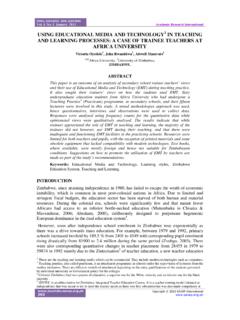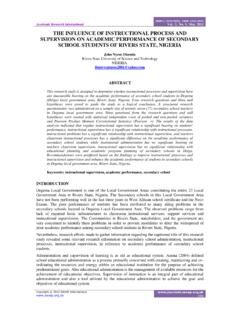Transcription of EFFECTS OF GLOBALIZATION ON EDUCATION IN AFRICA …
1 Academic Research International ISSN-L: 2223-9553, ISSN: 2223-9944 Vol. 2, No. 1, January 2012 Copyright 2012 SAVAP International 656 EFFECTS OF GLOBALIZATION ON EDUCATION IN AFRICA 1983-2008 Dr. Nkechi J. Okoli Faculty of EDUCATION University of Port Harcourt, NIGERIA ABSTRACT This study focuses on the EFFECTS of globalisation on EDUCATION in AFRICA in the past twenty-five years. Despite the positive impact, globalisation has divided the world into the superrich and absolutely poor.
2 AFRICA is the poorest of the poor, marginalized from world economy and EDUCATION . The disparities created by globalisation pressures on destabilizing the nations (in the use of the internet, per capita income and living standards and ability to produce and diffuse knowledge) are highlighted. The study also points out the socio-economic and educational inequalities and inequities resulting from globalisation flows and rifts. Educational Institutions in AFRICA , the Caribbean, Latin America, and Asia that took the IMF loan face the same dilemma, of the lost decade of the 1980.
3 A rethinking of globalisation, reversal of EDUCATION and economic growth fraught with injustice, inequality and degradation of human dignity is recommended. Educational empowerment of women is also recommended. Keywords: globalisation pressures, EDUCATION , inequalities, AFRICA INTRODUCTION This study looks at the EFFECTS of globalisation on EDUCATION in AFRICA in the past twenty-five years in relation to the technologies of the new century that have impacted the whole world seemingly positively.
4 The disparities (in the use of internet, etc) created by pressures and pulls of globalisation in destabilising the nation state. The devastating EFFECTS of globalisation pressures and flows on African economy and the consequences on EDUCATION , the socio-economic and educational inequalities and inequities that constitute injustice, reduction of human dignity, are also highlighted. Western EDUCATION in AFRICA was initiated by the missionaries during the colonial era and shortly after independence and is a victim of circumstance.
5 The struggle by African governments to provide mass EDUCATION for their people at all levels has met with obstacles, one of which is under review here. Autonomous African universities at inception in the 1960s expanded as a result of local and international supports. Inter-linkages were forged with United States Agency for International Development (USAID), Rockefeller and Ford Foundations, Carnegie Corporation and UNESCO and they all made commitments to help African universities.
6 There were interactions in various areas of academics - staff exchange, regular annual conferences and fellowships tenable in the and U. S for the conduct of research. African participation intensified and twenty-six other members that included Botswana, Lesotho, Swaziland, Ghana, Kenya, Malawi, Nigeria Liberia, etc. were involved (Fafunwa, 1991:202). African universities then, were of international repute. The pressures of globalisation brought drastic changes to all this.
7 Academic Research International ISSN-L: 2223-9553, ISSN: 2223-9944 Vol. 2, No. 1, January 2012 Copyright 2012 SAVAP International 657 Concept of Globalisation and the technologies of the 21st century Globalisation on the surface looks good given that the technological innovations of the 21st century have seemingly reduced the whole world to a global village, because of the flow of trade and investments, the ease of travel, ease with which we can see and hear news and most extraordinarily.
8 The internet which gives virtually limitless access to store of knowledge. Globalisation has affected every sphere of society and human living and so has been defined by writers in various ways in relation to the aspect being considered. It is the growing integration of economy and society around the world. It has become the concept with which huge economic, political, cultural changes that characterise human society at the turn of the 21st century is interpreted.
9 It was noted that globalisation gives a picture of a globalised world which involves net works which structure our behaviour by requiring that we use particular standard which often emerge unintentionally3.(Grewal, 2008 : 1) Thus there is a kind of competition by nations to meet the global standard. He further argued that a globalised world is lop-sided because globalisation serves the benefit of the In supporting the notion, it is noted that globalisation is emergent form of Western imperialism carried through cultural institution such as EDUCATION 4( Henry et al.)
10 , 2008:4). It was further explained globalisation does not infer that the entire globe has become westernised, but rather all sphere must establish their position in relation to capitalist West 5.(Waters,1995, in Henry et al., 2008 p. 21). Thus having a global standard clearly implies that some meet the standards while others do not and there is a pull to the standard. It was opined that globalisation not only pulls upwards, it pushes downwards creating new pressures for local autonomy( Giddens, 1998, in Henry et al.







